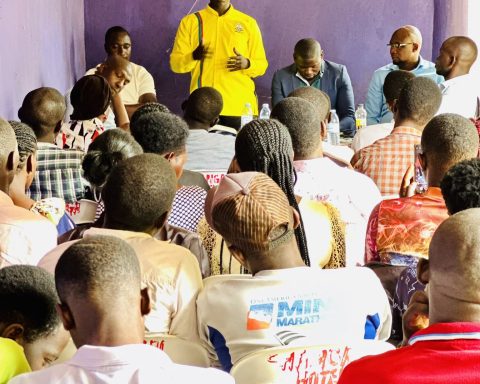KAMPALA — Prominent Ugandan businessman and property mogul Dr. Sudhir Ruparelia has issued a stern public warning following the circulation of a manipulated deepfake video falsely portraying him endorsing a dubious online financial platform.
The fraudulent video, allegedly generated using advanced Deepfake Artificial Intelligence (AI) technology, features a digitally altered version of Dr. Ruparelia appearing to claim that the Government of Uganda is “hiding information” about a so-called investment scheme that purportedly yields up to UGX 10 million per month from an initial investment of UGX 915,000.
The fabricated clip goes further to accuse the government of interference and censorship, alleging that previous videos were deleted and public inquiries ignored.
In the AI-generated voice that mimics Dr. Ruparelia’s tone and accent, the video falsely claims, “This platform is completely legal, licensed, and working in the country… those who have already invested UGX 915,000 are making UGX 10 million monthly, according to verifiable statistics.”
However, investigations by this news outlet have established that the video is a highly sophisticated forgery, likely created by repurposing authentic footage from a legitimate interview Dr. Ruparelia gave to the Uganda Broadcasting Corporation (UBC).
Both visuals and audio were digitally altered to fabricate a false endorsement.
“It’s a Scam,” Says Ruparelia
Dr. Ruparelia has categorically disassociated himself from the misleading content, describing the video as a malicious attempt to exploit his image and credibility for fraudulent gain.
“This is not me. My voice and image have been manipulated using AI to trick people into parting with their hard-earned money,” he said. “Please be careful—it is a scam. I have not endorsed any online investment platform promising unrealistic returns.”
The founder of the Ruparelia Group, whose business empire spans banking, real estate, floriculture, and hospitality, emphasised the need for the public to exercise extreme caution when approached with such offers, urging individuals to verify all investment opportunities through official channels.
Rise of AI-Driven Fraud
Cybersecurity experts have warned of a growing threat posed by AI technologies in the hands of fraudsters.
According to Dr. Angela Ndaka, a Kampala-based tech analyst, AI-generated content—especially deepfakes and cloned voices—has become a weapon of choice for online scammers.
“From creating realistic videos to mimicking voices with eerie precision, AI is making it easier for con artists to exploit public trust,” Dr. Ndaka noted. “These attacks are not limited to public figures. Everyday citizens are increasingly becoming targets.”
She warned that the scale and sophistication of such scams are likely to escalate unless public awareness and digital literacy improve significantly.
Call for Vigilance
Dr. Ruparelia, who rose from modest beginnings to become one of Uganda’s most influential entrepreneurs, is now using his platform to educate the public about the dangers of AI-powered deception.
“Don’t fall for the next one,” he cautioned. “If it sounds too good to be true, it probably is.”
Authorities are reportedly investigating the origins of the video, as concerns mount over the lack of regulation surrounding AI-generated media and the urgent need for digital protection frameworks to safeguard the public.
![]()




























